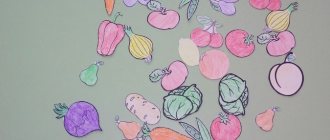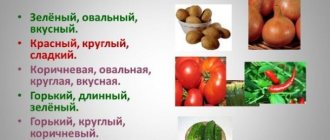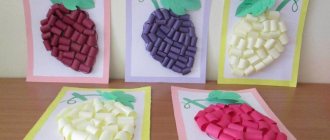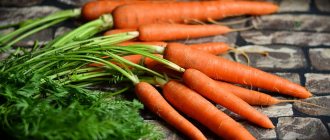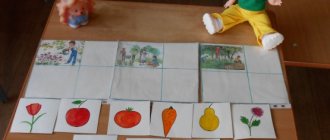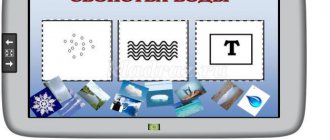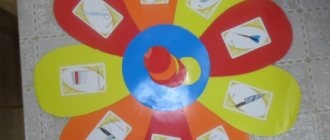A selection of didactic games on the linguistic topic “Fruits”, senior group
DIDACTIC GAMES
ON THE LEXICAL TOPIC “FRUITS”
(senior group)
Teacher – speech therapist Pilipenko I.S.
Game "What's added?"
Goal: to develop visual memory and attention, to activate the vocabulary of nouns on the topic.
Look at the pictures and remember them, I’ll add new ones, and you name them.
(Subject pictures depicting fruits.)
Game "Red, Yellow, Green"
Goal: to clarify children’s understanding of primary colors, to teach them to form adjectives that denote the attribute of an object by color.
Look at the pictures, what color is the fruit, tell me.
(Subject pictures depicting fruits.) Red apple, green pear, etc.
Game "Round, Oval"
Goal: to clarify children’s understanding of basic geometric shapes and to activate their vocabulary of nouns.
Look at the pictures, what shape is the fruit, tell me.
(Round apple, oval banana, etc.)
Game "Fourth wheel"
Goal: to teach children to identify their essential features in objects and make the necessary generalizations on this basis, to activate their subject vocabulary.
Look at the picture, name the extra item and explain your choice.
Apple, pear, tomato, banana.
Apple, orange, peach, banana.
Game “Say Kindly”
Goal: to teach children to form nouns using diminutive suffixes.
Don't yawn, my friend, but say a word. (Apple - apple; lemon - lemon, etc.)
Game "One - Many"
Goal: to teach children to form plural nouns in the nominative and genitive cases. We are little wizards, There was one, but there will be many. (Apple - apples - a lot of apples; pear - pears - a lot of pears, etc.)
Game "Fun Counting"
Goal: to teach children to coordinate nouns with the numerals “one”, “two”, “five”. We always know how many there are, We count everything well. (One apple – two apples – five apples, etc.)
Game “Which from what?”
Goal: to consolidate the use of relative adjectives and methods of their formation in children’s speech. Here is an object, and what did people make it from? (Apple juice – apple juice, etc.) Apple jam – apple jam, etc.)
Game "Choose the word"
Goal: learn to select adjectives for nouns. Children know everything in the world, what happens with us. What apple? – red, round, large, juicy, sweet. Etc.
Game "Fruit Story"
Goal: to teach children to compose a descriptive story using a reference diagram. Look at the fruit, tell me according to the diagram. Speak in order, don’t miss anything.
Game "Borscht or compote"
Goal: to teach how to classify vegetables and fruits, to introduce the specifics of preparing borscht and compote. Develop speech and memory.
Coloring stencils.
You can start painting apples. And so that at the end of the work we get a real masterpiece with neat, even edges, a stencil will help us:
Since kids will be coloring the apple, the stencil will need to be firmly attached to a sheet of paper with a stapler or tape.
Before you start coloring, you can put a real apple in front of your baby and learn to color “from life.” (But not all children under 3 or even 4 years old are able to grasp the meaning of coloring “from nature” - for this you need to “mature”).
Logical chains.
Logical chains is a game for older children. But with a child from 2 to 3 years old, you can try to arrange consecutive pictures together and talk about “what comes after what.” On the topic of fruits, I found the following logical chains:
You can download them by clicking on the picture.
Didactic games for children 5-7 years old in kindergarten on a lexical topic: Vegetables, fruits
Didactic games for children of senior preschool age on the lexical topic “Vegetables, fruits.”
Author : Tushmakova Natalya Nikolaevna, kindergarten No. 203 “Alice” ANO DO “Childhood Planet “Lada” Description : This material can be used by teachers of senior and preparatory groups to reinforce material on the topic “Vegetables, fruits”.
Working in a kindergarten, whose priority area is speech development, in a group of children with special needs development, I create didactic games on lexical topics myself, based on my own experience and the experience of my colleagues. I would like to present to your attention my new products, which help me a lot when conducting educational activities and joint activities with children in my free time. D/i "Gather the Harvest"
— Guys, autumn has come, vegetables and fruits have ripened at the dacha, it’s time to harvest.
- There are 3 baskets in front of you: in the first basket we will collect fruits whose name has 1 syllable; in the second - in the name of which there are 2 syllables; in the third - 3 syllables.
— How can you check how many syllables are in a word? (slap the word; tap the pencil on the table; put your hand under your chin - the number of times your chin touches your hand, the number of syllables).
— Guys, which basket has more fruits? How many more vegetables and fruits are in the second basket than in the first? Etc.
D/i “Choose names for vegetables”
Children are asked to choose a name for the vegetables. A leader is selected using a counting table, who rotates the arrow in the center of the circle and selects a vegetable.
Children look at clothespins with the names of vegetables.
Reading children read the written names, non-reading children highlight the first sound in the word and look for a clothespin with the desired sound, which is highlighted in red.
D/i "Vegetables and fruits - healthy products"
The game has 2 options.
In the first version,
children are asked to divide the harvest into vegetables and fruits.
We put vegetables in a basket, put fruits under a tree.
In the second option,
children are asked to make a salad from vegetables, and juice from fruits.
Children name the resulting salad (cucumber salad - cucumber) and juice (pineapple juice - pineapple).
Further the task becomes more complicated. Juice from apple and pear - apple-pear, cabbage and carrot salad - cabbage-carrot.
Game "Come up with a riddle"
To reinforce the distinctive features of vegetables and fruits, children are asked to come up with riddles using algorithm class=”aligncenter” width=”629″ height=”472″[/img] For example: - This vegetable grows in a garden bed, it is triangular in shape, orange in color, sweet what does it taste like?
(carrot). — This fruit grows on a tree, it is oval-shaped, yellow, very sour, what is it? (lemon). Dear colleagues, thank you for your attention! I hope this material will help novice teachers in their work.
We recommend watching:
Didactic games for children 5-7 years old: Winter sports Educational game for children 4-7 years old: “Magic bag of cards” Didactic game for social and communicative development for children of the senior group Games for speech development in the senior group of kindergarten
Similar articles:
Assignments on the topic “Forest” for children 6-8 years old
Methods of using didactic games in kindergarten in the senior preparatory group
A game of attention.
Show your child the picture (when you click on the picture, it will appear in higher resolution. If you decide to print the picture, feel free to save it and send it for printing - it is designed for A4 format):
Ask to find all the same apples.
If you are lucky and have several varieties of different apples at home, then you can play this game with real apples.
